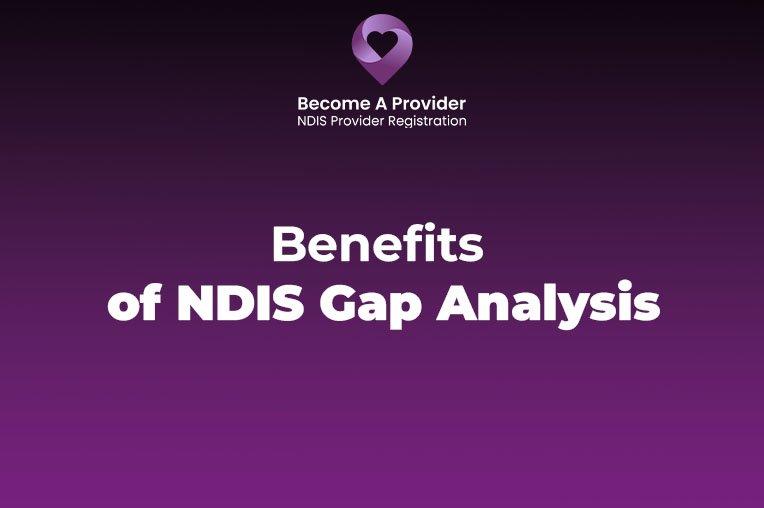NDIS Gap Analysis
Schedule Your Free NDIS Consultation Now!
Schedule Your Free NDIS Consultation Now!
In the realm of NDIS provider registration, ensuring that your organisation meets the stringent criteria set by the National Disability Insurance Scheme (NDIS) is paramount. The NDIS Gap Analysis is a vital assessment tool designed to evaluate your current operational practices against the NDIS Practice Standards. This thorough analysis not only identifies potential areas of non-compliance but also offers strategic recommendations to align your organisation with NDIS requirements, ensuring that you are fully prepared for NDIS registration and ongoing audits.
What is NDIS Gap Analysis?
NDIS Gap Analysis is a structured approach designed to highlight areas where your organisation may not fully comply with the NDIS Practice Standards. Whether you are preparing for initial NDIS provider registration or ensuring ongoing compliance, this analysis is crucial. The process involves a thorough evaluation of your documentation, insightful interviews with key team members, and an in-depth analysis of your organisational processes. The goal is to provide a clear roadmap for addressing any gaps and ensuring that your organisation meets the required standards.
Key Objectives of NDIS Gap Analysis
01 Compliance Assessment
The primary objective of the NDIS Gap Analysis is to assess your organisation’s adherence to the legal requirements and NDIS Practice Standards. This assessment covers all aspects of your operations, from governance and risk management to participant outcomes and service delivery. Ensuring compliance is not just about meeting legal obligations; it is about maintaining the trust and safety of the participants you serve.
02 Gap Identification
Identifying areas of non-compliance is a crucial step in the NDIS Gap Analysis. This involves a meticulous review of your existing policies, procedures, and practices to pinpoint any gaps that could lead to non-compliance. These gaps might relate to documentation, operational processes, or even staff training and awareness.
03 Recommendations for Improvement
Once gaps have been identified, the next step is to propose actionable strategies to address them. Our consultants provide detailed recommendations on how to bridge these gaps, improve operational efficiency, and align your practices with NDIS requirements. This could involve revising policies, enhancing staff training, or implementing new systems and processes.
04 Preparation for NDIS Registration or Audit
Whether you are applying for NDIS provider registration for the first time or preparing for an audit, the NDIS Gap Analysis is an essential step. By addressing identified gaps proactively, your organisation can ensure a smoother registration process and be better prepared for any upcoming audits.
Our Trusted NDIS Registered Provider









Benefits
of NDIS Gap Analysis

01 Enhanced Compliance
One of the most significant benefits of conducting an NDIS Gap Analysis is the reduction in the risk of non-compliance. By ensuring that your organisation meets the NDIS Commission’s strict criteria, you can avoid the potential penalties and reputational damage associated with non-compliance. This proactive approach not only safeguards your organisation but also enhances the quality of care provided to NDIS participants.
02 Risk Mitigation
The NDIS Gap Analysis helps to identify potential hazards and weaknesses in your business operations. By taking proactive steps to rectify these issues, you can minimise the risks to your organisation, staff, and the participants you serve. This includes addressing any areas of vulnerability in your service delivery, governance, or risk management processes.
03 Operational Efficiency
Aligning your methods and processes with NDIS regulations and industry best practices can significantly enhance your operational efficiency. The recommendations provided through the NDIS Gap Analysis are designed not only to ensure compliance but also to streamline your operations, making them more effective and sustainable in the long term.
04 Audit Preparation
Preparing for NDIS audits and inspections can be a daunting task, but with the insights gained from an NDIS Gap Analysis, your organisation will be better equipped to face these challenges. By addressing any compliance gaps in advance, you can approach audits with confidence, knowing that your organisation is fully compliant with NDIS standards.
Understanding NDIS Gap Analysis
The NDIS Gap Analysis process entails a detailed review of your organisation’s policies, procedures, and practices concerning the NDIS Practice Standards. This comprehensive review is aimed at uncovering any disparities between your current operations and the expectations set forth by the NDIS Commission. By identifying these gaps early, your organisation can take proactive steps to rectify them, thus avoiding the risks associated with non-compliance.
The NDIS Gap Analysis Process
01 Initial Consultation and Planning The NDIS Gap Analysis begins with an initial consultation, during which we gain an understanding of your organisation’s specific needs and challenges. This is followed by detailed planning, where we outline the scope of the analysis, identify key stakeholders, and set timelines for completion.
02 Documentation A critical component of the NDIS Gap Analysis is the review of your organisation’s documentation. This includes policies, procedures, business plans, and any other relevant records. Our consultants meticulously examine these documents to ensure they align with NDIS requirements.
03 Interviews and Observations In addition to reviewing documentation, our consultants conduct interviews with key personnel within your organisation. These interviews provide valuable insights into your operational processes and help to identify any areas where practice may not align with documented procedures. Observations of day-to-day operations may also be conducted to gain a more comprehensive understanding of your organisation’s compliance status.
04 Gap Identification and Analysis After gathering all relevant information, our consultants conduct a detailed analysis to identify any gaps between your current practices and NDIS requirements. This analysis is thorough and considers all aspects of your operations, from governance and management to service delivery and participant outcomes.
05 Reporting and Recommendations Following the analysis, we provide a comprehensive report detailing our findings. This report outlines the identified gaps, explains the implications of non-compliance, and offers clear, strategic recommendations for addressing these issues. The report serves as a roadmap for your organisation to achieve full compliance with NDIS standards.
06 Implementation Support Our support doesn’t end with the delivery of the report. We work closely with your team to implement the recommended changes, offering guidance and support throughout the process. This may include revising documentation, providing staff training, or assisting with the development of new operational procedures.
07 Follow-up and Continuous Improvement Compliance with NDIS standards is not a one-time effort but an ongoing process. We offer follow-up services to ensure that the implemented changes are effective and that your organisation continues to meet NDIS requirements. Regular reviews and updates to your policies and procedures will help maintain compliance and promote continuous improvement.
Hear From Our Clients
Frequently Asked Questions (FAQs)
The purpose of an NDIS Gap Analysis is to identify areas where your organisation may not fully comply with NDIS Practice Standards. This analysis helps to pinpoint gaps in your policies, procedures, and operational practices, allowing you to address these issues before they lead to non-compliance.
An NDIS Gap Analysis is a crucial step in the NDIS provider registration process. By identifying and addressing compliance gaps, your organisation can ensure that it meets all the requirements for registration, reducing the risk of delays or rejections.
Yes, the recommendations provided through an NDIS Gap Analysis are designed not only to ensure compliance but also to streamline your operations. By aligning your practices with NDIS standards and industry best practices, you can enhance the efficiency and effectiveness of your organisation.
It is recommended to conduct an NDIS Gap Analysis regularly, particularly before significant events such as audits or registration renewals. Regular analyses help to ensure ongoing compliance and support continuous improvement within your organisation.
If gaps are identified during the NDIS Gap Analysis, our consultants will provide clear and actionable recommendations to address them. We also offer implementation support to help your organisation make the necessary changes and achieve full compliance with NDIS standards.



